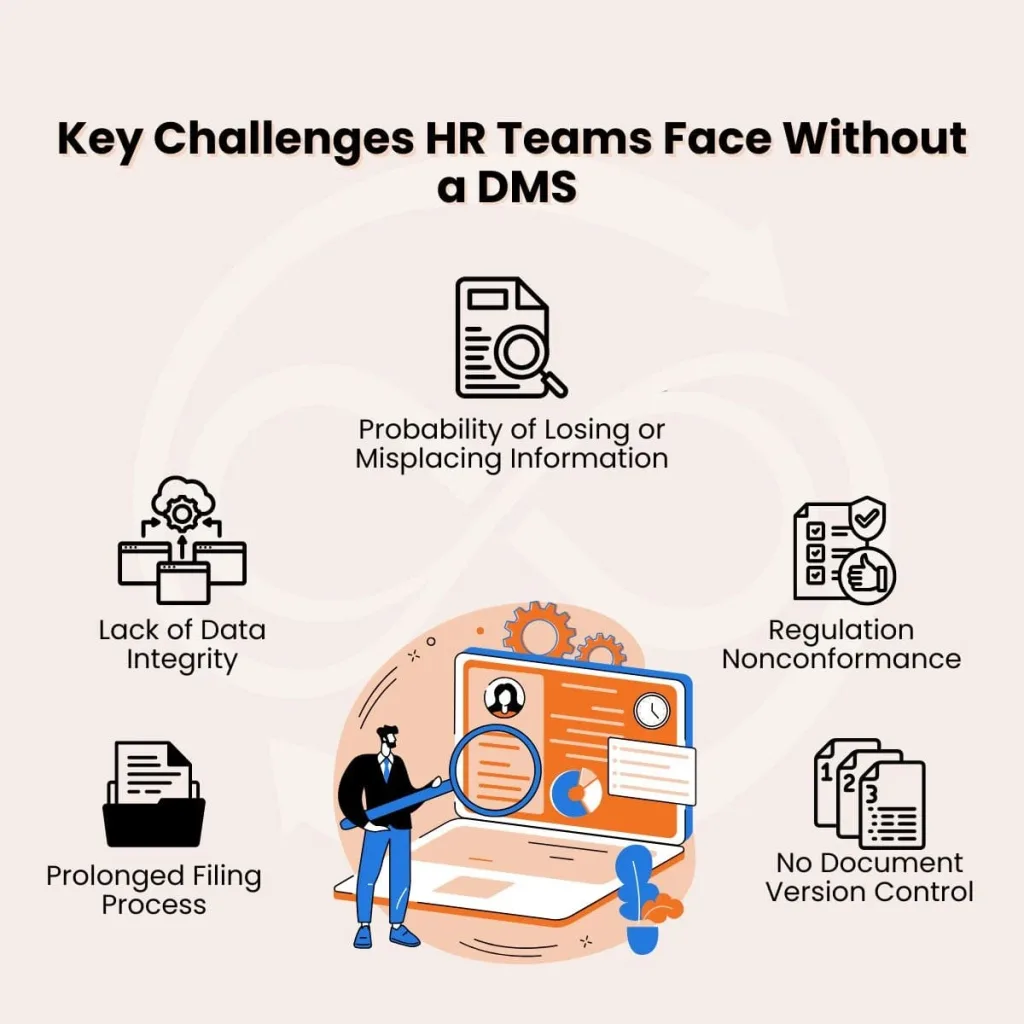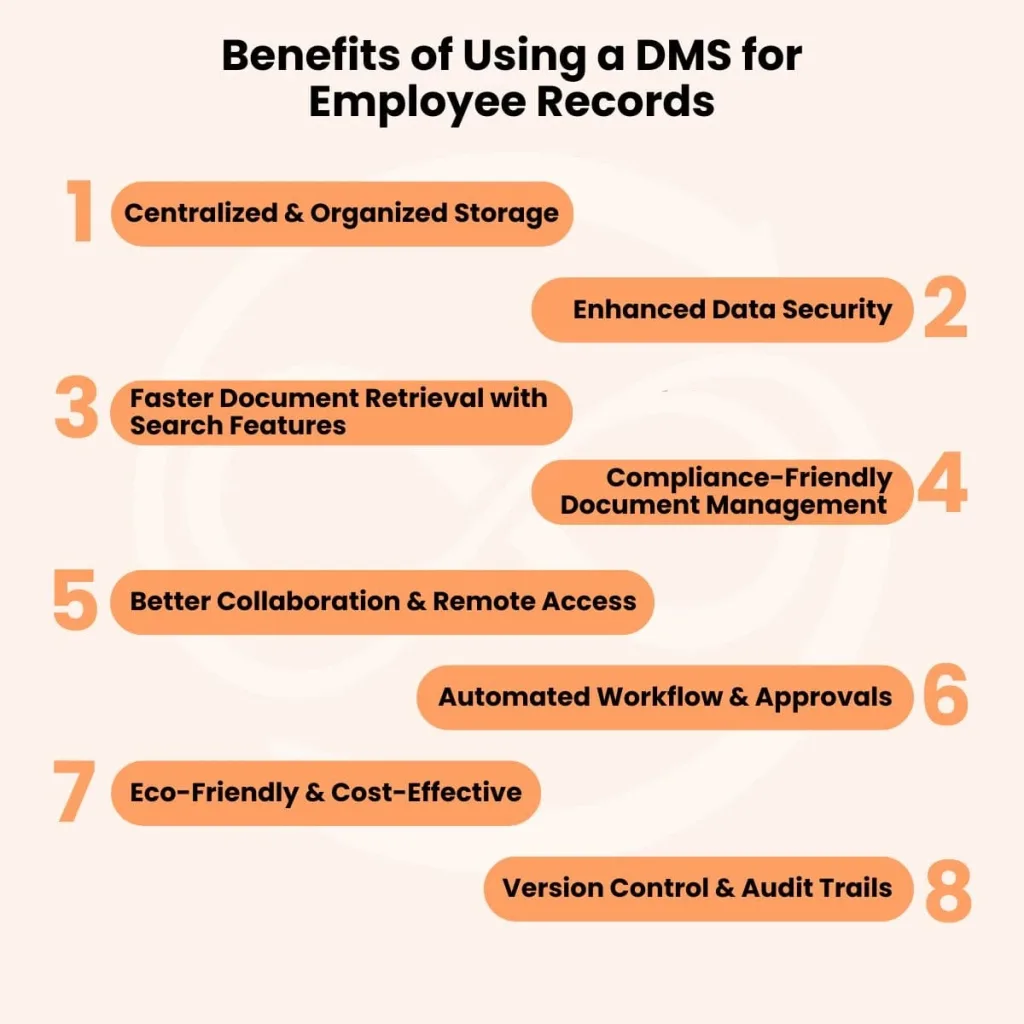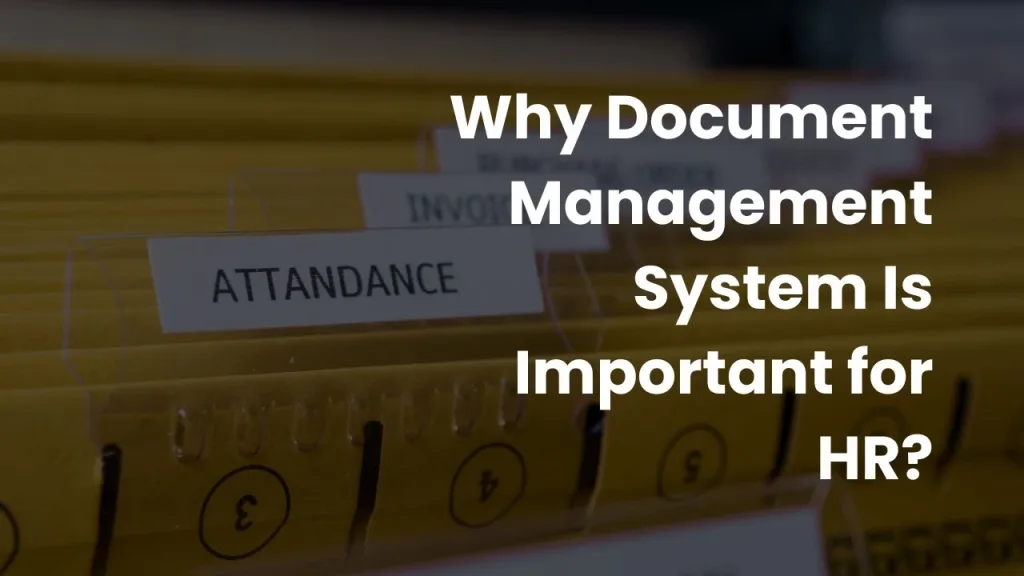Keeping up with employee records has always been a top concern for Human Resource (HR) departments. Offer letters, medical certificates, performance reports, compliance documents, etc. HR teams constantly manage large volumes of highly sensitive and confidential information related to employees.
Up until now, most HR departments relied either on hand-written files or digital folders. With the increase in hybrid working models, larger workforce sizes, and growing compliance requirements, these conventional methods have become less viable and more dangerous.
Here is where a Document Management System (DMS) comes into play. HR teams can now digitally store, retrieve, organize, and manage employee records using a DMS, which helps make data management streamlined, safe, and efficient.
Table of Contents
What is a Document Management System (DMS)?
A document management system (DMS) is a software application that aids organizations in securely managing, storing, retrieving, and tracking documents within a centralized repository.
For a Human Resources team, a DMS offers an efficient method of filing sensitive related documents that improves document security and compliance while improving accessibility.
Know More:
Key Challenges HR Teams Face Without a DMS

To explain the benefits, let’s take a look at the common mistakes HR departments face while managing employee records using paper files or simple systems:
- Probability of Losing or Misplacing Information: Physical files can be damaged, stolen, or misplaced, and cyber folders are not immune to device crashing. Even files stored in one’s computer’s local drive pose the danger of deletion due to device failure.
- Prolonged Filing Process: Losing an employee’s record in the hundreds or even thousands of files can result in no productivity at all. This problem has been termed as tracking productivity loss in modern HR parlance.
- Lack of Data Integrity: Confidential and sensitive information like ID proofs, salaries, medical data, etc., are contained in employee records. Without taking adequate precautions, there is a potential for data breaches to these records.
- Regulation Nonconformance: Data protection policies around labour policies, GDPR, and identification policies demand control over employee data. Non-standardized manual storage of such records increases the likelihood of facing regulatory non-compliance and incurring penalties quite drastically.
- No Document Version Control: With the ability to only read and update employee information without managing versions, tracking changes becomes impossible. As a result, employees end up with outdated information, creating confusion.
Benefits of Using a DMS for Employee Records

- Centralized & Organized Storage
A DMS offers a single storage location for all staff files in a systematic file hierarchy, enabling HR to retrieve any document almost instantly.
HR can customize folders for various purposes, including:
- Onboarding Documents
- Identity verification KYC documents
- Appraisal Reports
- Training Certificates
- Resignation or Exit Records
Everything stays organized, searchable, and ready for audits.
- Enhanced Data Security
Advanced features of modern DMS systems ensure:
- Security of Cloud Storage
- Document Encryption
- User Authentication
- Audit Trail Creation
- Access Control Based on Roles
Furthermore, this limits access to confidential information to designated HR staff, which mitigates the chances of data breaches.
- Faster Document Retrieval with Search Features
Organizing documents using employee ID numbers, names, document titles, smart searches, and metadata tagging allows HR teams to retrieve any information in an instant.
Stop wasting time sifting through countless files and folders.
- Compliance-Friendly Document Management
Using document management systems (DMS) allows HR departments to stay compliant with rules associated with:
- Copyright and Data Protection Association (GDPR)
- Labour Laws
- Employee Privacy Rules
- Retention Policies
Automation can also set retention schedules for each document that guarantees safe archiving or legally compliant destruction within specified timelines.
- Better Collaboration & Remote Access
With a cloud-based DMS, HR teams can share and access documents related to employees from anywhere, which is particularly beneficial for remote and hybrid work settings.
Granted specific privileges, managers can now digitally view particular records about specific employees without having to depend on paper-based files or being physically present at the office.
- Automated Workflow & Approvals
Newer DMS platforms now include automation tools that simplify the following HR functions:
- Approval of documents
- Onboarding procedures for new hires
- Management of leave
- Reminders for documents that need renewal
Automation on these processes lowers the amount of manual work in filing paperwork, and speeds up the making of decisions.
- Version Control & Audit Trails
All changes done through a document management system (DMS), including edits and updates, are tracked, including keeping a complete version history.
DMS systems are particularly useful for HR audits, legal disputes, and any other matters as the DMS will provide proof of document integrity.
- Eco-Friendly & Cost-Effective
A DMS helps achieve sustainability objectives while reducing operational costs in the long run by saving paper, storage space, and printing expenses.
How to Choose the Right DMS for HR Document Management?
When choosing a Document Management System (DMS) to support your HR functions, consider the following essential requirements:
- Intuitive design
- Accessible on the cloud
- Comprehensive security measures
- Compatible with HRMS or payroll systems
- Folder systems that can be tailored as per needs
- More intricate than simple search options
- Automated document procedures
- Notifications for documents needing renewal
- Access limitations based on user functions
Some of the more common options for DMS in HR are:
- M-Files
- OpenText
- Microsoft SharePoint
- Document360
- Zoho WorkDrive
Conclusion
In the contemporary world, HR professionals cannot utilize traditional systems for handling employee records. The chances of losing data or suffering from security risks and legal fines are far too dangerous. Upgrading to modern document management systems (DMS) offers Human Resource departments an effective means of securely and professionally managing sensitive employee information.
A DMS drives the optimization of daily HR activities and provides enduring advantages, which include improved work pace, increased organizational compliance, and heightened office order.

